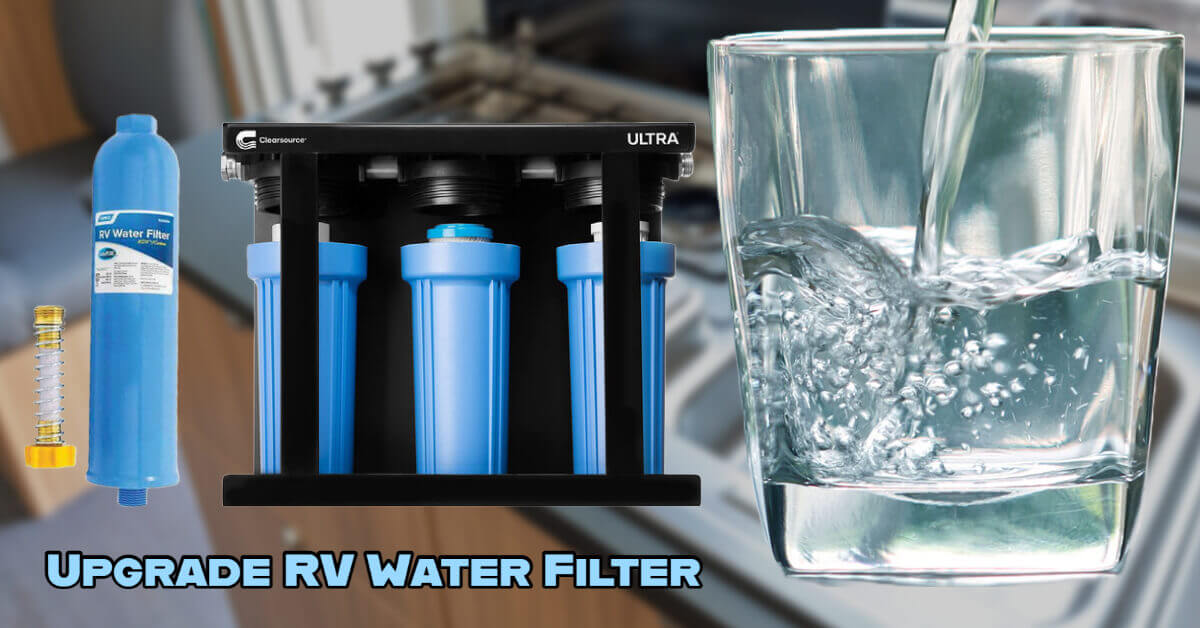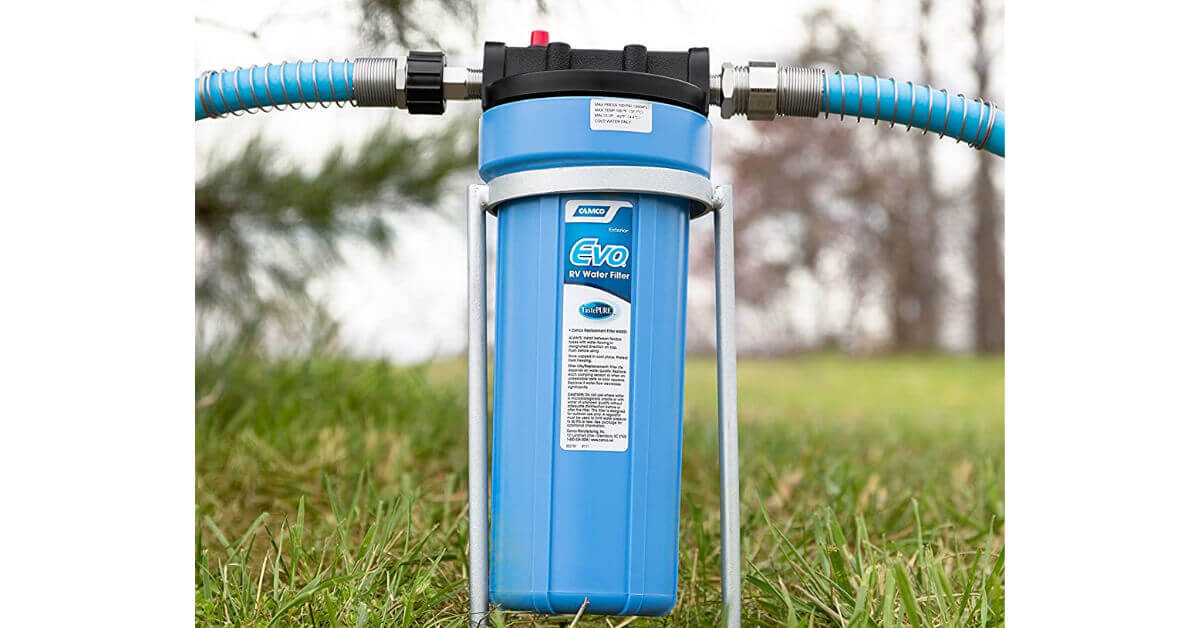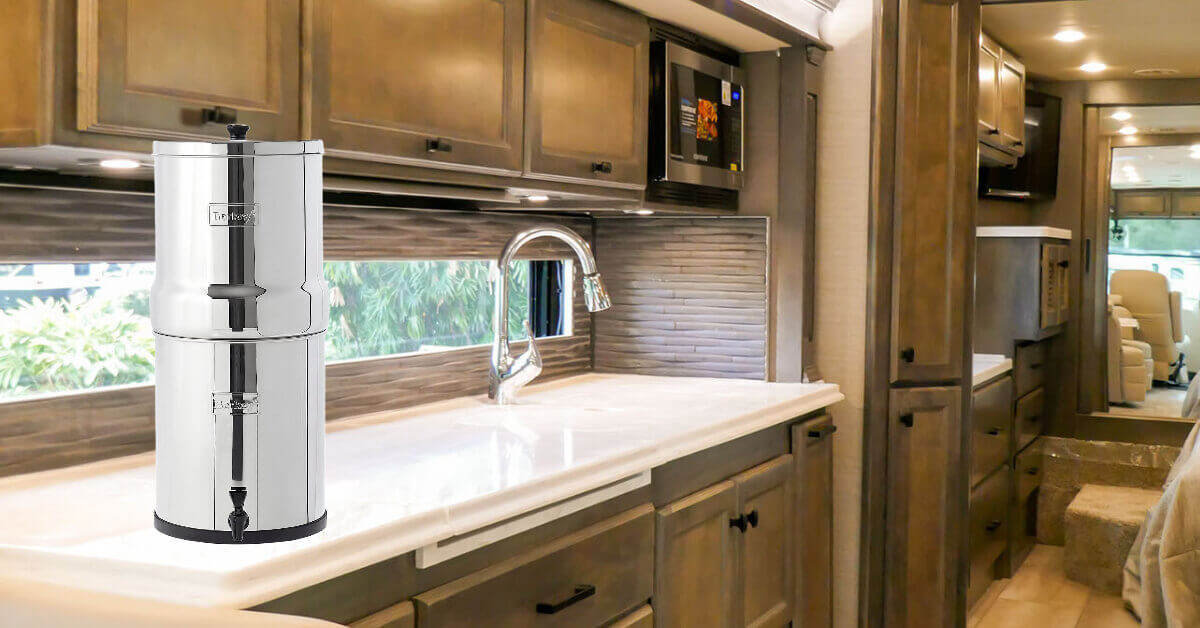- Home Page
- Favorite RV Accessories
- Upgrading Your RV Water Filter
Upgrading Your RV Water Filter: Say Goodbye to Dirty RV Water
Upgrading your RV water filter can make a tremendous difference in your drinking and bathing water quality.
As an RV owner, you know how important it is to have access to clean and safe drinking water. However, the water quality can vary widely depending on where you are camping, and it can be challenging to find potable water sources. Even if you do find a water source, it might only be safe and tasty enough to drink with treatment. This is when upgrading your RV water filter comes in handy.
In this article, we will review the benefits of upgrading your RV water filter system and explore the different types of filters available to help you choose the best water filter for your needs.
Why Upgrade Your RV Water Filter System?
Upgrading your RV water filter system is a wise investment that can improve your overall RVing experience. Here are some reasons why:
- Improved Water Quality: a high-quality RV water filter system can remove impurities and contaminants from your water, resulting in cleaner and safer drinking and bathing water.
- Better Taste: Water that has been filtered tastes better than unfiltered water. This means you can enjoy a refreshing glass of water without the unpleasant taste of chlorine or other chemicals.
- Healthier Water: Filtering your water can remove harmful bacteria, viruses, and parasites that can cause illness. Upgrading your RV water filter system ensures that your family stays healthy while on the road.
- Cost Savings: By using a water filter, you can save money by not having to purchase bottled water or costly water treatment systems.
Types of RV Water Filters
Several types of RV water filters are available, each with advantages and disadvantages. The most common types are:
- Carbon Filters: Carbon filters are the most popular type of RV water filter. They use activated carbon to remove chlorine, bad taste, and odor from the water. Carbon filters are affordable, easy to install, and require little maintenance.
- Ceramic Filters: Ceramic filters are another popular type of RV water filter. They are made of porous ceramic material that traps impurities and bacteria. Ceramic filters are more expensive than carbon filters but are more effective at removing harmful contaminants.
- Reverse Osmosis Filters: Reverse osmosis filters are the most effective type of RV water filter. They use a membrane to remove virtually all contaminants from the water, including bacteria, viruses, and parasites. However, they are also the most expensive and may require professional installation.
How to Choose the Right RV Water Filter
Choosing the right RV water filter can be challenging, but there are a few factors to consider that can make the decision easier:
- Water Source: Consider where you will be camping and the quality of the water source. If you are camping in an area with questionable water quality, invest in a more expensive and effective filter.
- Budget: Decide how much you are willing to spend on an RV water filter. Carbon filters are the most affordable, while reverse osmosis filters are the most expensive.
- Installation and Maintenance: Consider the installation and maintenance requirements of the filter. Some filters may require professional installation, while the owner can easily install others.
Using Stand-Alone Drinking Water Filters in Your RV
There are some RVers who choose not to drink the filtered water that comes from their RV's Fresh Water Tank or the RV's City Water connection. They choose to bring bottled water with them.
An alternative for them is to use a stand-alone drinking water filter system like the Big Berkey Water Filter System (pictured Above) or a Water Filter Pitcher.
Conclusion
Investing in an RV water filter upgrade is smart for any RV owner who wants clean, safe, and great-tasting water while on the road. Choosing a filter that meets your needs and budget is essential with so many available types. Whether you choose a carbon filter, ceramic filter, or reverse osmosis filter, you can enjoy the benefits of cleaner, healthier, and better-tasting water. By considering factors such as water source, budget, and installation requirements, you can choose the right filter for your RV and have the peace of mind of knowing that you and your family are drinking safe and clean water.
In addition to providing clean drinking water, an RV water filter can also improve the quality of the water you use for bathing and cleaning. This means you can enjoy a refreshing shower or wash your dishes without worrying about harmful contaminants in the water.
In conclusion, upgrading your RV water filter system is a wise investment that can enhance your RV experience in many ways. By choosing the right filter and following the manufacturer's instructions for installation and maintenance, you can ensure that you have clean, safe, and great-tasting water wherever you go.
Say goodbye to dirty water and hello to a healthier and happier RV lifestyle by upgrading your RV water filter today!
What are the benefits of upgrading your RV water filter system?
What are the benefits of upgrading your RV water filter system?
Upgrading your RV water filter system can improve your drinking and bathing water quality. It can remove impurities and contaminants, resulting in cleaner, safer, and better-tasting water. Filtering your water can also remove harmful bacteria, viruses, and parasites, ensuring that your family stays healthy while on the road. In addition, using a water filter can save you money by not having to purchase bottled water or costly water treatment systems.
What are the
different types of RV water filters available on the market?
What are the different types of RV water filters available on the market?
The most common types of RV water filters available on the market are carbon, ceramic, and reverse osmosis filters. Carbon filters use activated carbon to remove chlorine, bad taste, and odor from the water. Ceramic RV water filters are made of porous ceramic material that traps impurities and bacteria. Reverse osmosis filters use a membrane to remove virtually all contaminants from the water, including bacteria, viruses, and parasites.
How do carbon filters work?
How do carbon filters work?
Carbon filters use activated carbon to remove chlorine, bad taste, and odor from the water. The carbon material attracts and absorbs impurities and contaminants, producing cleaner and better-tasting water. Carbon filters are affordable, easy to install, and require little maintenance.
What factors should I consider when choosing the right RV water filter?
What factors should I consider when choosing the right RV water filter?
When choosing the right RV water filter, you should consider the water source, your budget, and the installation and maintenance requirements of the filter. If you are camping in an area with questionable water quality, invest in a more expensive and effective filter. Carbon filters are the most affordable, while reverse osmosis filters are the costliest. Some filters require professional installation, while you can easily install others.
How can an RV water filter upgrade enhance my RV experience?
How can an RV water filter upgrade enhance my RV experience?
An RV water filter upgrade can improve your RV experience in many ways. It can provide clean, safe, and great-tasting water for drinking, bathing, and cleaning. Removing harmful contaminants can also ensure that you and your family stay healthy while on the road. Investing in an RV water filter upgrade can save you money by not having to purchase bottled water or costly water treatment systems.






Comments
Do you have a comment on this topic? You can leave your comment in the box below.